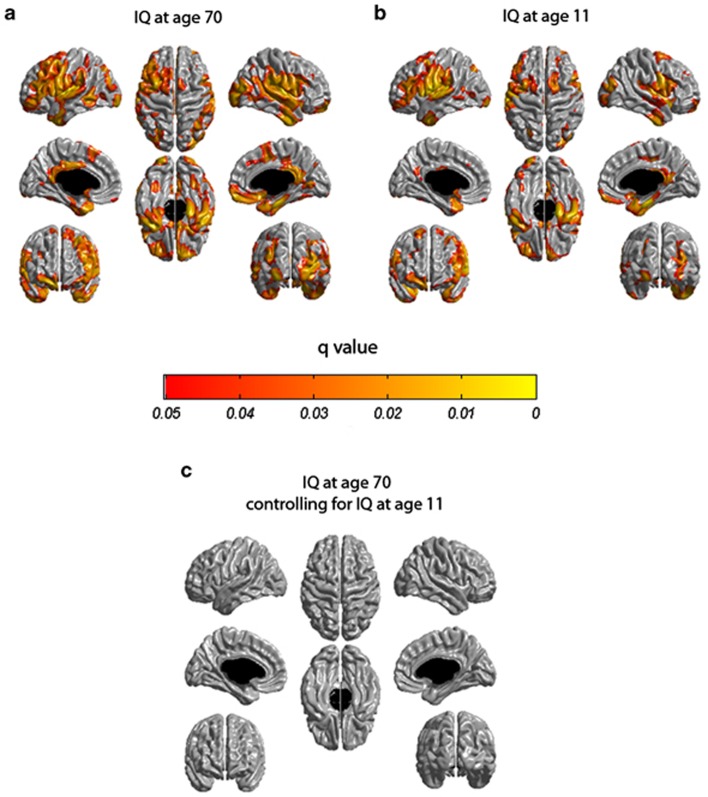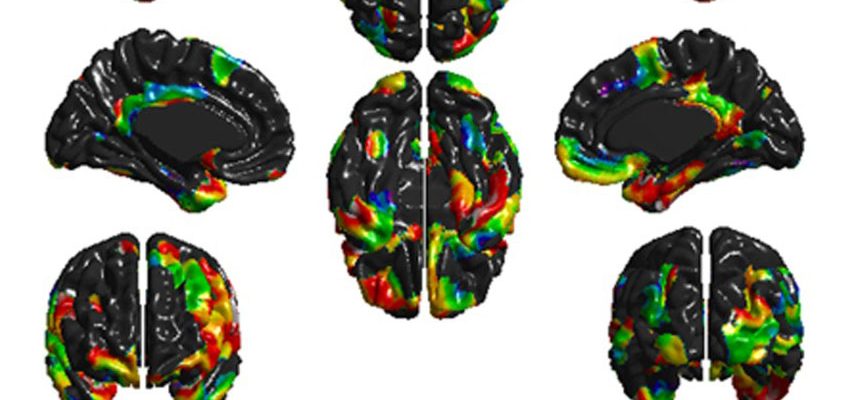Mol Psychiatry. 2014 May;19(5):555-9. doi: 10.1038/mp.2013.64. Epub 2013 Jun 4.
Karama S1, Bastin ME2, Murray C3, Royle NA2, Penke L4, Muñoz Maniega S2, Gow AJ5, Corley J3, Valdés Hernández Mdel C2, Lewis JD6, Rousseau MÉ6, Lepage C6, Fonov V6, Collins DL6, Booth T5, Rioux P6, Sherif T6, Adalat R6, Starr JM7, Evans AC6, Wardlaw JM2, Deary IJ5.
Author information
- Department of Neurology and Neurosurgery, McConnell Brain Imaging Center, Montreal Neurological Institute, McGill University, Montreal, QC, Canada [2] Department of Psychiatry, Douglas Mental Health University Institute, McGill University, Verdun, QC, Canada.
- Brain Research Imaging Centre, Division of Clinical Neurosciences, University of Edinburgh, Edinburgh, UK [2] Department of Psychology, Center for Cognitive Ageing and Cognitive Epidemiology, University of Edinburgh, Edinburgh, UK [3] SINAPSE (Scottish Imaging Network, A Platform for Scientific Excellence) Collaboration, Division of Neuroimaging Sciences, University of Edinburgh, Edinburgh, UK.Department of
- Psychology, University of Edinburgh, Edinburgh, UK.
- Department of Psychology, Center for Cognitive Ageing and Cognitive Epidemiology, University of Edinburgh, Edinburgh, UK [2] SINAPSE (Scottish Imaging Network, A Platform for Scientific Excellence) Collaboration, Division of Neuroimaging Sciences, University of Edinburgh, Edinburgh, UK [3] Department of Psychology, University of Edinburgh, Edinburgh, UK.
- Department of Psychology, Center for Cognitive Ageing and Cognitive Epidemiology, University of Edinburgh, Edinburgh, UK [2] Department of Psychology, University of Edinburgh, Edinburgh, UK.
- Department of Neurology and Neurosurgery, McConnell Brain Imaging Center, Montreal Neurological Institute, McGill University, Montreal, QC, Canada.
- Department of Psychology, Center for Cognitive Ageing and Cognitive Epidemiology, University of Edinburgh, Edinburgh, UK [2] Alzheimer Scotland Dementia Research Centre, Department of Psychology, University of Edinburgh, Edinburgh, UK.
Abstract

Associations between brain cortical tissue volume and cognitive function in old age are frequently interpreted as suggesting that preservation of cortical tissue is the foundation of successful cognitive aging. However, this association could also, in part, reflect a lifelong association between cognitive ability and cortical tissue. We analyzed data on 588 subjects from the Lothian Birth Cohort 1936 who had intelligence quotient (IQ) scores from the same cognitive test available at both 11 and 70 years of age as well as high-resolution brain magnetic resonance imaging data obtained at approximately 73 years of age. Cortical thickness was estimated at 81 924 sampling points across the cortex for each subject using an automated pipeline. Multiple regression was used to assess associations between cortical thickness and the IQ measures at 11 and 70 years. Childhood IQ accounted for more than two-third of the association between IQ at 70 years and cortical thickness measured at age 73 years. This warns against ascribing a causal interpretation to the association between cognitive ability and cortical tissue in old age based on assumptions about, and exclusive reference to, the aging process and any associated disease. Without early-life measures of cognitive ability, it would have been tempting to conclude that preservation of cortical thickness in old age is a foundation for successful cognitive aging when, instead, it is a lifelong association. This being said, results should not be construed as meaning that all studies on aging require direct measures of childhood IQ, but as suggesting that proxy measures of prior cognitive function can be useful to take into consideration.
PMID:23732878 | PMCID:PMC3998074 | DOI:10.1038/mp.2013.64
Supplemental information
-
Publication type
MeSH terms
- Adolescent
- Adult
- Aged
- Aging/pathology*
- Aging/psychology*
- Brain/pathology*
- Child
- Cognition
- Cohort Studies
- Cross-Sectional Studies
- Female
- Humans
- Intelligence*
- Intelligence Tests
- Magnetic Resonance Imaging
- Male
- Middle Aged
- Organ Size
- Regression Analysis
- Sex Factors
- Young Adult
Grant support
More Resources
Full Text Sources
- Nature Publishing Group
- Europe PubMed Central
- Ovid Technologies, Inc.
- PubMed Central


